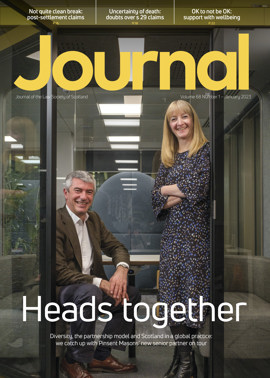Tradecraft tips: January 2023

Wayward solicitors – 1
In a dispute involving a claim against an executry, the solicitor acting for the claimant intimated to us his intention to resign agency because he was not able to take the case on to the next stage. I did not want my clients to know about this before the claimant himself had been informed, as he was the son-in-law of one of my clients. Accordingly, I asked the other solicitor to inform me once he had written to his client resigning agency so that I could bring my clients up to date with developments.
Not only did he write to me at the appropriate time, he also gave me a copy of the letter which he had sent to his client, intimating resignation of agency but also spelling out what he regarded as the shortcomings in his client’s case. Reading the copy letter, my eyes came out on stalks. Under no circumstances should I have been copied directly into solicitor to client correspondence. In a contentious situation, you have to be very careful not to communicate anything at all to the other side beyond what is necessary or what is supportive of your client’s case.
Wayward solicitors – 2
At a meeting with the beneficiaries in an estate, the solicitor acting proposed that a legacy should be created for someone who was not in the will to begin with. I considered that this was completely out of order. Such a proposal, if it should have been made at all, should have been contained in a letter to the beneficiaries and they should have been given time to consider it and to consult with one another, if appropriate. As it happened, I felt that they had been bounced into making a decision on the spot.
As a solicitor, you have a certain amount of influence over people, but this has to be exercised with a considerable amount of discretion on occasion. If, for example, you perceive an injustice in a will, is it really your place to try to redress the balance? A will is a set of instructions and it is the solicitor’s job to implement those instructions. If the testator had wanted X to benefit from the will, then X would have been mentioned.
Self sufficiency
In a longrunning dispute, my clients were getting fed up with the delay, and even though they were completely in the right, they were seriously considering conceding the matter just to get some sort of closure. This would not only have diminished the value of their house; it would also have written off the value of the many hours of work which I had done on the matter, including two site visits. However, I could well understand the clients’ frustration.
The Canadian singer/songwriter Joni Mitchell has a wonderful line in one of her songs: “You know I’ll try to be there for you when your spirits start to sink.” In such situations you have to keep your clients’ spirits up and try to point the way to a final resolution.
In dealing with awkward cases, my inclination is always to seek a solution which requires little, if any, input from third parties. In this case, such a thing was possible and this is what was done. In a letter to his mother, T E Lawrence (of Arabia) wrote: “Imagination should be kept in the most precious caskets.” You have to try to use your imagination in moving your clients towards a solution which gives them something positive out of the situation, rather than just chucking in the sponge because they are losing heart.
Chronological order
Clients were buying a small area of ground from the neighbouring country estate, and also seeking a minute of waiver from the estate to allow a farm steading to be converted to residential accommodation. The price for the whole package was £25,000 but, as the estate had elected to waive exemption from VAT on their ground, another £5,000 would have to be paid to cover the VAT. This was a major problem and, as one of the clients was a businesswoman, I suggested that she should consult her accountant. She replied that he was “useless at VAT”, so I had to try to work out a solution.
By laying the events out in chronological order, I noticed that my clients had acquired the steading site before the estate had elected to waive exemption from VAT and, in any event, the value of the ground which they were buying was only £1,000, the remainder of the price being for the waiver of the restriction in the title, which restriction was not actually agricultural ground as such and therefore not subject to VAT. This brought the VAT bill down from £5,000 to a much more acceptable £200. Reading over a file again right from the beginning and laying out the component parts in a coherent order and studying them carefully can occasionally produce positive results. Do not grudge the time it takes to do this.
Regulars
Perspectives
Features
Briefings
- Civil court: Costs – the tail that wags the dog
- Licensing: Keeping alcohol out of sight
- Planning: A framework for sustainability?
- Insolvency: When is a creditor not a creditor?
- Tax: A new, improved autumn statement?
- Immigration: First stop Rwanda?
- Scottish Solicitors' Discipline Tribunal: January 2023
- Civil court: Expenses – barred by delay?
- Property: Transparency, human rights and the registers







